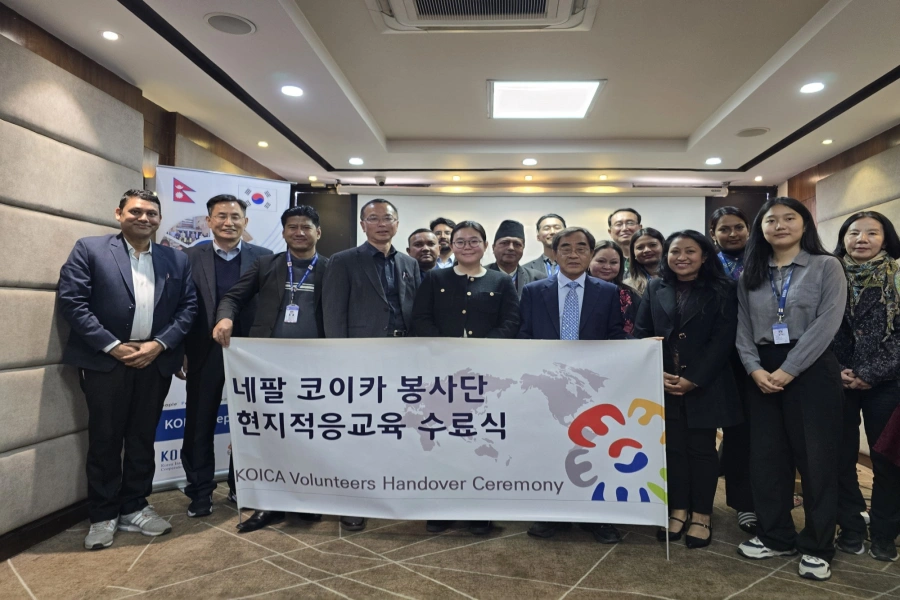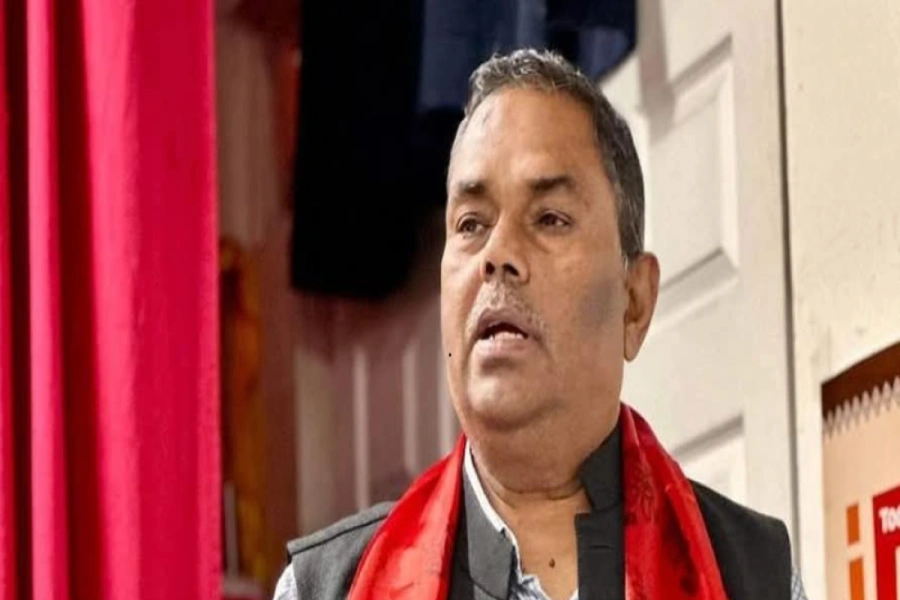GORKHA, June 26: In the scorching heat of June, a tiny one-room shack—without windows and with just a single door—lies covered in tin sheets. Inside this cramped, suffocating space, the blistering sun makes the atmosphere unbearable. Here, sweaty and uncomfortable, are one-month postpartum Manika Pariyar and her newborn child. With no land even to use for their name, Manika’s aunt Parvati Pariyar has no choice but to call this dilapidated shanty a palace of comfort.
Twenty-one-year-old Manika from Bakrang Samidanda, Sahid Lakhan Rural Municipality-1, is nurturing her fragile one-month-old son in this shanty. Since becoming pregnant, she has been forced out by her husband and abandoned by her family—in January, she delivered her baby boy at Gorkha Hospital.
“And so, what father’s name did they give him?” This question cut Manika even deeper. She froze, as if she’d fallen from a roof, then recovered and said, “Sister, it's been a month and I haven't thought of a name yet. If his father had come forward, I would have named him.”
Manika had married 23-year-old Milan Shrestha of Gajuri-2, Dhading, in December 2023.
Manika didn’t expect Milan’s family to accept her since their marriage was based on inter-caste. “He is Newar, I’m Dalit’s daughter. Our family is not going to accept us, before we drown into the ocean of love, let’s stop speaking. However, he was stubborn. Promised much, and even once threw himself off a three-story roof, all to ensnare me with love.” Manika, who had never experienced love before, fell for him.
“Having never received anyone’s love in my life, I easily fell for his words. He welcomed me into his home as his wife with much celebration. He introduced me as a Brahmin to his family. He even invited relatives and neighbors and hosted a feast. I had told him not to lie, but he used to say, ‘Once we’re married, they’ll have to accept us—don’t worry.’ So I did exactly as he said.”
After their marriage, they returned to their workplace in Chitwan. Both of them worked at the Coca-Cola factory located in Godrang, Bharatpur Metropolitan City-1. “After we came back to Chitwan, Milan’s family found out about my caste. His parents called us and said, ‘You two are dead to us—don’t come back here.’ After that, going to his home was out of the question,” Manika said, holding back tears. Even now, she remembers those days as a dark period in her life.
In 2018 at the age of 14, Manika followed a woman she knew from her village to Chitwan. That same woman helped her get a job at the Coca Cola factory. “I used to study at Mahendra Shakti Secondary School in my village,” she said. “I failed in Grade 8 while my classmates moved on. I felt ashamed and stopped going to school. Our family was struggling financially—there was nothing but hardship. So, I came to Chitwan thinking I could earn a little money.”
Marriage – cost, preparation and what not

She met Milan while working at the factory. As they continued working together, they grew closer. “We got close through work talk. One day, he said he’d commit suicide if I didn’t marry him,” she said. “I was young, poor, unloved at home. I thought maybe he loved me. Others warned him I’d get beaten if something happened, but still, I married him.”
Last year, in April 2024, the Coca-Cola factory where Manika and Milan worked laid off many employees, including them. With no jobs and only two rooms to live in, they faced difficulties even affording food. As a result, they went to Kathmandu in search of employment. In Kathmandu, Milan found work at a meat shop, while Manika was looking for small jobs.
“I was hunting for a job, one day, I came to know that I am pregnant. I didn’t plan to keep the baby—too young, no income, nowhere to live. But Milan insisted, saying we could manage later. So I stayed with the pregnancy, hoping somehow we’d raise the child.” During pregnancy, she tested positive for dengue, and as per the doctor’s advice she returned home. Milan also joined her by quitting the job. After some time in Bakrang, I sent him to Jhapa for work with borrowed money. After he left, Manika said he changed drastically.“I didn’t have a phone at that time, and we barely had any contact after he left. He had changed a lot.”
Recalling the beginning of her dark days, she continued, “After Milan went to Jhapa, some women from the village started telling me he was posting pictures of another girl on Facebook. I borrowed someone’s phone and checked. I tried calling him, but he only argued with me. After repeatedly insisting, he finally came back in February. The Milan who once claimed he would die for me was now a completely different person. During his four or five days here, we argued dozens of times. Then he left, and I haven’t heard from him since.”
By the time she shared all this, Manika’s eyes were not just wet with tears—they were streaming down her cheeks, soaking into her chest. According to her, when Milan returned last February, he had told her he was going to his mother’s house. A few days after he left, Manika’s aunt Parbati received a phone call from one of Milan’s younger relatives. The caller said Milan had brought another woman home, Manika recounted.
“After he left me, I found out from one of his village relatives that he had told people his ‘first wife had left him’ and brought another girl home,” Manika said, tears welling up in her eyes. “Even that second girl was from a different caste, and when his parents found out, they kicked both of them out. When I heard that—while carrying his child—I felt like I had fallen off a cliff.”
“As soon as I heard the news, I didn’t think twice. I borrowed Rs 100 from my aunt and went to Khaireni. I had no money, and the only jewelry I owned was a small silver necklace and ring. I sold them in Khaireni. Since I didn’t even have a phone, I took my cousin's sister with me to Gajuri. Once we got there, I used her phone to call and message Milan repeatedly, but he didn’t respond. I was like a madwoman—lost, not knowing where to go or whom to talk to.”
“There was a police post in Gajuri, but they said I’d need money to file a complaint. I only had enough for the return trip. I was so broke that I couldn’t even afford drinking water. I was pregnant, and watching others drink water on the bus made me swallow my own saliva. We returned to Khaireni using the little money I had from the silver jewelry. We spent one night at my uncle’s place. But the pain—who could I share it with? So I came back home the next day. What I’ve gone through—Didi, even a stray dog doesn’t suffer like this,” she said, finally breaking down.
After Milan went out of contact, the women in Manika’s village tried to comfort her, saying, “He’ll definitely come back seeing your condition.”
“It’s been three months since Milan disappeared,” she said. “Thinking about all the suffering I’ve gone through during this time, I now feel like I don’t need anyone in my life.”
She continued, “My due date was May 19, but there were no signs of labor. On May 22, I went to Gorkha Hospital without a single rupee in hand. Labor lasted six hours. The baby was finally born, but he was diagnosed with jaundice and thyroid issues.”
“While I was kept in Gorkha Hospital, the baby had to be taken to Bharatpur Government Hospital for further treatment. He spent three days in the NICU there. All the expenses—mine, the baby's, delivery, food—everything has been covered through donations. Shiv BK (Dai) and Mandira BK (Bhauju) from the village helped with everything. Others in the village also pitched in, and that’s how we managed to cover all the medical expenses.”
Left alone when she needed her husband the most, Manika now has no expectations from anyone. “What hope can I have from a man so cruel he abandoned me in this condition?” she said. “He’s dead to me now. If he comes back just to give our son his name and legal rights, that’s enough. As for me, I’ve learned what it means to grow up without a mother. My only goal now is to raise my son with all I have and make him a good man.”
When asked, “What do you want your son to become?” Manika gave a faint smile and said, “Our bond happened unintentionally, and I don’t know what the future holds. So even if his father doesn’t return, I’ll name him Anjan—the unknown. Whatever he becomes is in his fate. But one thing I hope for: may he never become like his father. I want him to grow up to be a good, respectable man.”
Manika was just seven when she lost her mother. “I don’t even have a clear memory of her. When she died, my father was working in India. My younger brother was only two. It was our grandmother who raised us,” she said. “It was many years later that my father returned home. He never remarried, but he couldn’t take care of us either. That’s just how life is in the village—constant scarcity, and my father is old now, unable to work like others.”
She recalls how her father never intervened—not when she dropped out of school in grade eight, not when she left for Chitwan to work, not when she married at a young age, and not even now, after she has given birth to a child.
“Father never says much—he barely speaks,” Manika said, tears welling in her eyes. “That’s why my 19-year-old brother and I are both stranded like this. He left for Pokhara, dropping out of school too. But my father doesn’t seem to care. Maybe if our mother were alive, she would have guided us. Maybe I wouldn’t have ended up like this. Even now, if she were here, she would’ve taken care of me.”
Having grown up swamps of hardship, she now feels she is drowning in an even deeper sea of sorrow. “My life feels like a fish that leapt out of a clay pot only to land in a ditch,” she lamented.
-Pratiksha Ale / RSS





































